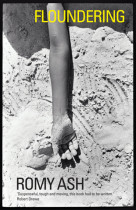These days I’m travelling overseas so Romy Ash’s novel Floundering held some travel narrative synergy and a touch of nostalgia for Australia’s ragged landscape.
Two sons are being driven to an uncertain destination by their mother (who asks the boys to call her Loretta) in a car “yellow, brown and bubbled with rust” they call Bert.
It’s almost a kidnap and definitely an Aussie road trip; one that’s kind of fun but also stressful — with the occasional tea-hot Coke to drink from a bottle that’s been rolling around on the car floor, baking car seats, and their mother shoplifting junk from service stations so the boys have odd bits and pieces of food in their bellies and thongs instead of school shoes for their feet.
It’s true, there’s something seductive about not knowing where you’re going each day — being taken. There can also be something frightening about it. In the boys’ case, some of the fear revolves around the fact that they’re never sure if they’ll be fed or, if they are, what the next meal will consist of. This is completely different to when they were living with their grandparents where there was “always cordial in a blue plastic jug” and regular meals to eat.
Still, children often adjust easily to change. And mothers deserve a chance to give their kids the kind of life they imagine will be good for them. But is this still true even if it means mum and kids are eating sweet corn out of ancient tins, living in an old caravan without adequate water and the kids are running wild on the beach, burning and brushing up against friendly or downright dangerous folk, day after shapeless day?
Tom and Jordy are rough-and-tumble boys but good-hearted. They needle one another, as brothers will, but more often they try to be what their mother seems to need them to be. It’s not easy. Loretta’s distracted, in a world of her own leanings and fading in and out of contact. She’s also prone to disappearing without telling the boys when, or if, she’ll be back.
They disappear on her a bit, too. They’re so unused to her presence it feels awkward determining boundaries. Tom, especially, is often on tenterhooks; worried. When he’s really worked up he repeats phrases in his mind like mantras or whimpers to ward off fear and threat.
A pivotal and perfectly rendered scene is when Loretta takes the boys floundering. She wants to show them how to spear the flounder in the shallows when the tide is on the turn — just as her father (the boys’ Pa) once showed her.
The night is dark and Tom is scared and loses hold of Loretta’s T-shirt. He ends up in deep water where he nearly drowns. Jordy saves him, comforts him and ensures he gets back on his feet with some confidence. Jordy is appalled that their mother was not upset about the incident and showed no care and concern once Tom was safe.
Floundering is a deceptively simple novel with a deeply sinister undertow.
Left to their own devices the boys get dirtier, thirstier, hungrier and more desperate.
All around them the world is crumbling, decaying, fraying and desiccating. They get wounded (Tom by his mother’s hairdressing scissors), stung by sand flies, whipped by wind and dried out, taut as drum skins (to use Ash’s metaphor), by the harsh Australian sun.
Despite all this, the boys still want to believe the best will happen. It’s a devastating moment when Nev (an abusive man from the van opposite) says to them that they’re chasing a mirage and they need to let it go.
Precisely. But they’re too young to have to learn this, surely?
There’s a sparse quality to the language that builds tension. There is also some fine description.
For example:
- Jordy’s hair after a day at the beach “looks like a windsock in a northerly”.
- Bert’s antenna is “a coat hanger in the wonky shape of a heart”.
- Nev’s dropped cigarette stub “is the colour and shape of a child’s severed finger”.
The boys have an edgy authenticity. They’ve been through a lot together — watched out for one another through thick and thin — and we know there’s more of this to come.
Seeing them flounder their way through the rough life thrown at them is like watching a couple of injured birds trying to fly. It’s painful and, at more than one point in their story, I really wished it would stop.
I was also disturbed by how much I wanted a better life for these boys — a happy ending. Why, I wondered, would children be left in this state? How come it is so hard for their mother to make things work for them, just this once?
There are a lot of unanswered questions in this book, with things unseen and unsaid or things glimpsed only partially. I really liked how Ash resisted going into too much detail and the backstories were only hinted at. I felt the narrative was enlivened by these gaps.
One small niggle. “Can I’ve a drink?” might be one way to express Australian idiom but the use of “I’ve” in sentences like this grated for me each and every time.
Apart from this, I responded to the novel by floundering. I think Ash had me speared exactly where she wanted me; pinned down and thrashing about in cold and murky waters. Enter this book at your own risk.




Recent Comments